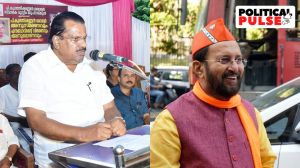- India
- International
Krishnamurthy Subramanian, ISB professor and Raghuram Rajan student, is named new CEA
The Appointments Committee of the Cabinet approved Subramanian’s application to the CEA post for a period of three years, the Centre said in a notification
 Krishnamurthy Subramanian had termed demonetisation a revolutionary step in the fight against corruption.
Krishnamurthy Subramanian had termed demonetisation a revolutionary step in the fight against corruption.
The Centre Friday appointed Indian School of Business (ISB) Hyderabad Professor Krishnamurthy Subramanian — a vocal advocate of demonetisation and a student of former RBI Governor Raghuram Rajan — as the Chief Economic Advisor for a period of three years.
Subramanian’s appointment fills in a key gap in the Finance Ministry ahead of the government’s last budget before the 2019 Lok Sabha polls. The CEA post has been vacant since Arvind Subramanian’s resignation in June this year after a four-year stint.
A PhD in Financial Economics from the University of Chicago Booth School of Business, Subramanian, 47, serves on the boards of Bandhan Bank, the National Institute of Bank Management and the RBI Academy. He was a member of P J Nayak Committee on Governance of Bank Boards and the Uday Kotak Committee on Corporate Governance, as well as a member of Sebi’s Standing Committee on Primary Markets and Secondary Markets.
The Appointments Committee of the Cabinet approved Subramanian’s application to the CEA post for a period of three years, the Centre said in a notification. Subramanian will take charge with effect from “the date of his assumption of charge of the post or, until further orders, whichever is earlier.”
An IIT-IIM alumnus, Subramanian currently serves as Associate Professor & Executive Director, Centre For Analytical Finance at the ISB, Hyderabad.

Earlier this year, Subramanian had also applied for the post of RBI Deputy Governor, for which the government received 43 applications. On June 4, however, the Centre appointed M K Jain, managing director and chief executive officer, IDBI Bank, to the post.
Writing an opinion column in The Times of India just days after demonetisation was announced on November 8, 2016, Subramanian termed the cash withdrawal move a revolutionary step in the fight against corruption. “…current checks and balances against tax evasion are far tighter. Relatedly, the government’s (demonetisation) move reflects popular angst against corruption and unaccounted wealth. The presence of such factors in the voting population is unlikely to provide future governments the luxury of relaxing their efforts to fight corruption. Thus, Tuesday’s action may be revolutionary in the annals of the country’s fight against corruption,” he wrote.
In another opinion piece, titled ‘In debt to dynasty? Rule by the Gandhis has repeatedly pushed the country towards indebtedness’, in The Times of India on July 2, 2016, Subramanian wrote that governments run by the Gandhi family expanded subsidies manifold, indulged in wasteful expenditure and pushed the future generations into debt. The Gandhi dynasty built a mountain of subsidies without worrying about its disastrous economic consequences, he wrote.
“Governments run by The Dynasty doled out subsidies and other transfers to the tune of Rs 689,600 crore every year, as opposed to Rs 183,300 crore by non-dynastic governments. Subsidies doled out by them amounted to 9.2% of GDP, almost double that doled out by non-dynastic governments (5.3%)… Governments run by The Dynasty doled out largesse and spent wastefully while indebting future generations of this country,” he wrote.
Subramanian has written several research papers on topics including borrower distress and debt relief, corporate governance, state intervention in the banking sector and labour laws.
Among the many research papers that Subramanian wrote in collaboration with Viral Acharya (now RBI Deputy Governor), a 2016 paper on “State intervention in banking: the relative health of Indian public sector and private sector banks” advocates privatisation of some public sector banks and the winding down of the worst asset quality in PSBs.
In the paper, Subramanian and Acharya also recommend that the government must “distance itself from several bank governance functions” to improve governance in PSBs.
“For this purpose, the Bank Nationalisation Acts of 1970 and 1980, together with the SBI Act and the SBI (Subsidiary Banks) Act must be repealed. All banks be incorporated as regular corporations under the Companies Act and must be mandated to satisfy the corporate governance norms prescribed by the Securities Exchange Board of India. The process of board appointments, including appointments of whole-time directors, needs to be professionalised,” they said in the paper.
The Finance Ministry had invited applications for the CEA post in July. Apart from giving advice to the government on a range of policy issues, a key task for the CEA is to bring out the annual Economic Survey.
Apr 26: Latest News
- 01
- 02
- 03
- 04
- 05








































